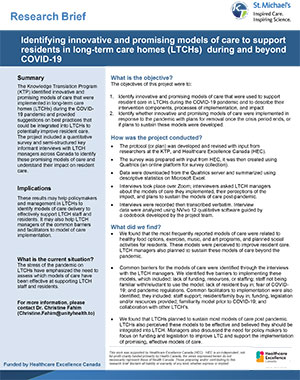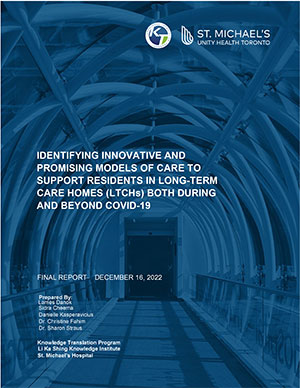Identifying innovative and promising models of care to support residents in long-term care homes during and beyond COVID-19
What is this?
This project identified innovative and promising models of care that were implemented in long-term care homes (LTCHs) during the COVID-19 pandemic and provided suggestions on best practices that could be integrated into LTCHs to potentially improve resident care. This project was funded by Healthcare Excellence Canada. Healthcare Excellence Canada is an independent, not-for-profit charity funded primarily by Health Canada. The views expressed herein are those of the authors and do not necessarily represent the views of HEC or Health Canada.
What did we do?
he Knowledge Translation Program (KTP) identified innovative and promising models of care that were implemented in long-term care homes (LTCHs) during the COVID-19 pandemic and provided suggestions on best practices that could be integrated into LTCHs to potentially improve resident care. The project included a quantitative survey and semi- structured key informant interviews with LTCH managers across Canada to identify these promising models of care and understand their impact on resident care.
What are the results?
We found that the most frequently reported models of care were related to healthy food options, exercise, music, and art programs, and planned social activities for residents. These models were perceived to improve resident care. Furthermore, LTCH managers planned to sustain these models of care beyond the pandemic.Common barriers for the models of care were identified through semi-structured interviews with LTCH managers. The KTP identified five barriers to implementing these models, which included: lack of funding, resources, or staffing; staff not being familiar with/reluctant to use the model; lack of resident buy in; fear of COVID-19; and pandemic regulations. Common facilitators to implementation were also identified; they included: staff support; resident/family buy in; funding, legislation and/or resources provided; familiarity model prior to COVID-19; and collaboration with other LTCH’s.This study found that LTCH planned to sustain most models of care post pandemic. LTCHs also perceived these models to be effective and believed they should be integrated into LTCH. Managers also discussed the need for policy makers to focus on funding and legislation to improve LTC and support the implementation of promising, effective models of care.
Category : TIES Projects
Date : 13 Feb 2023



